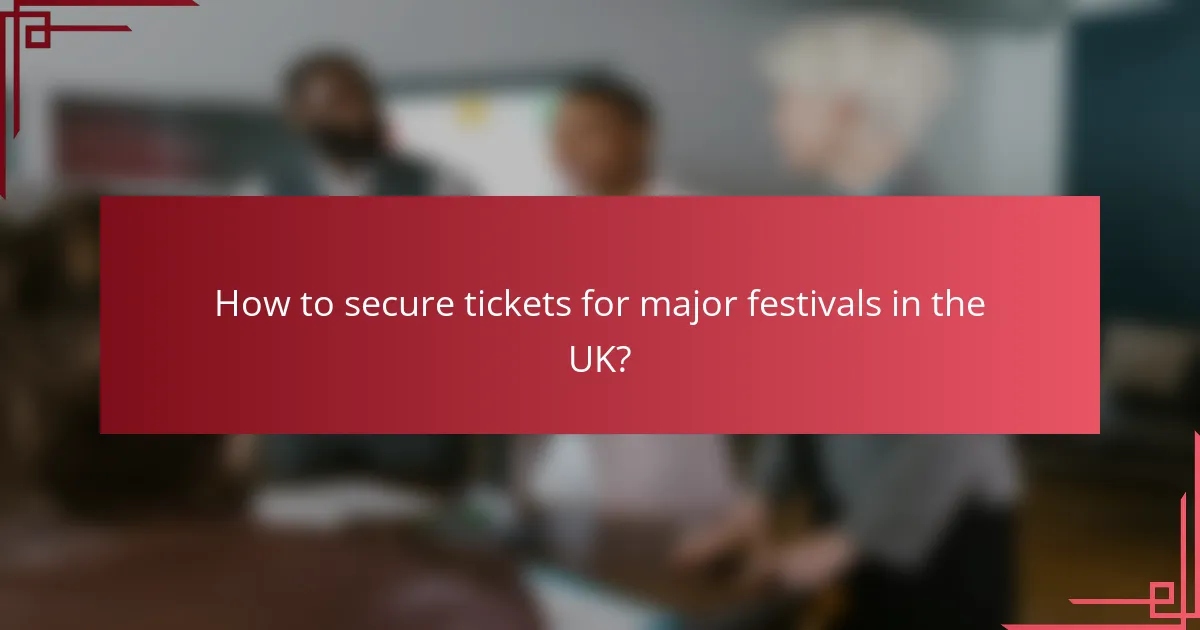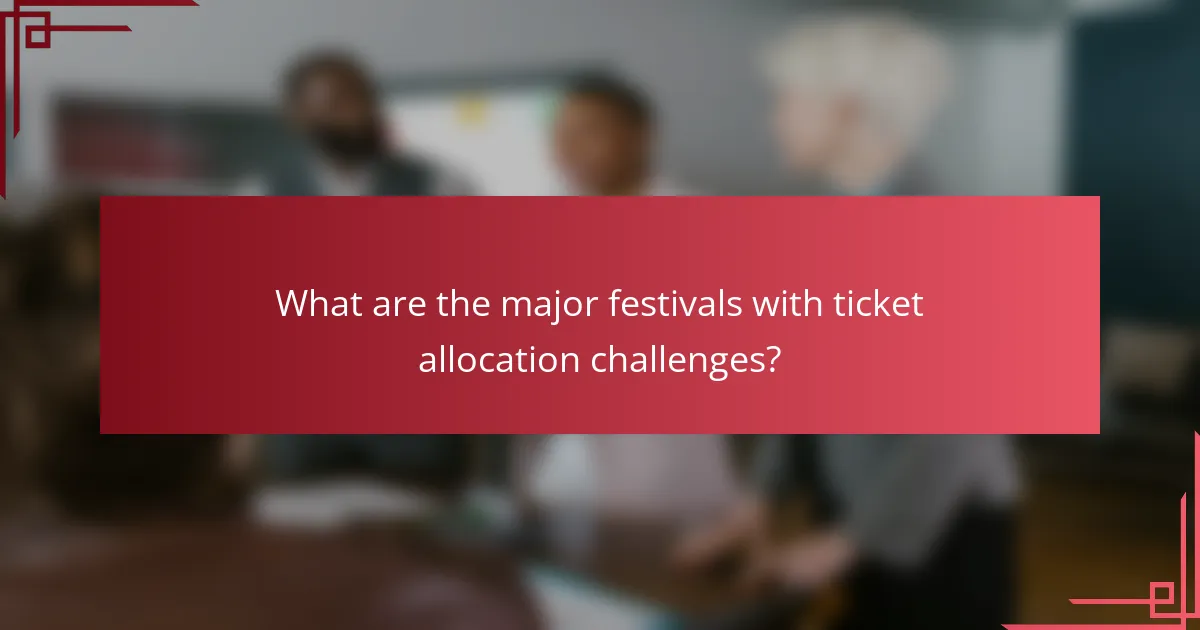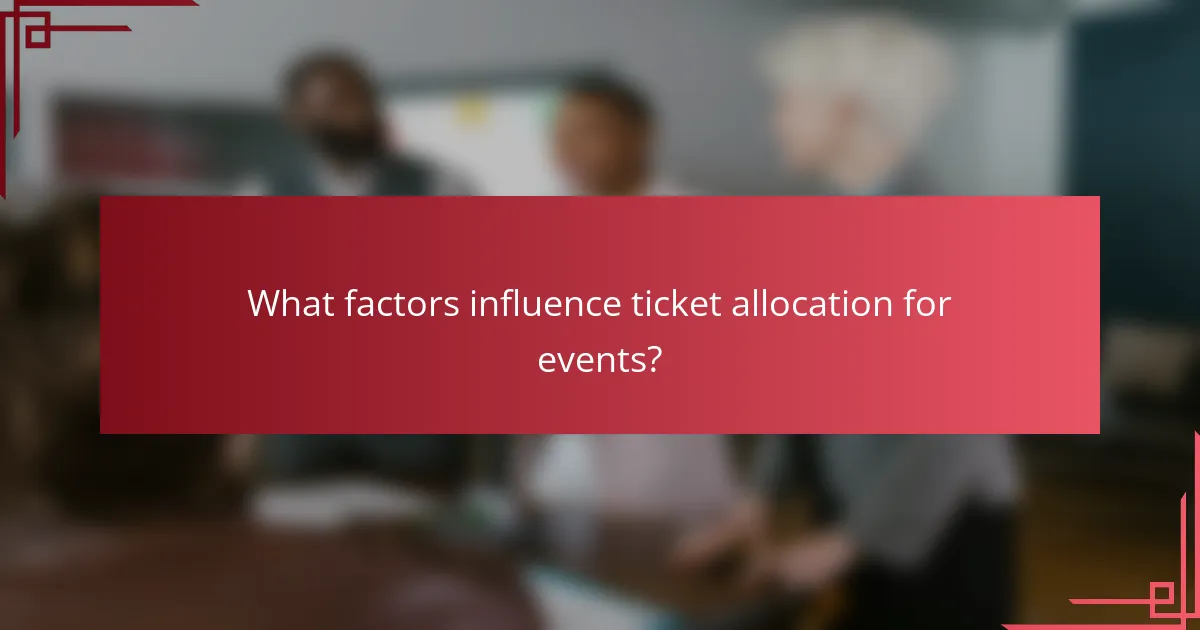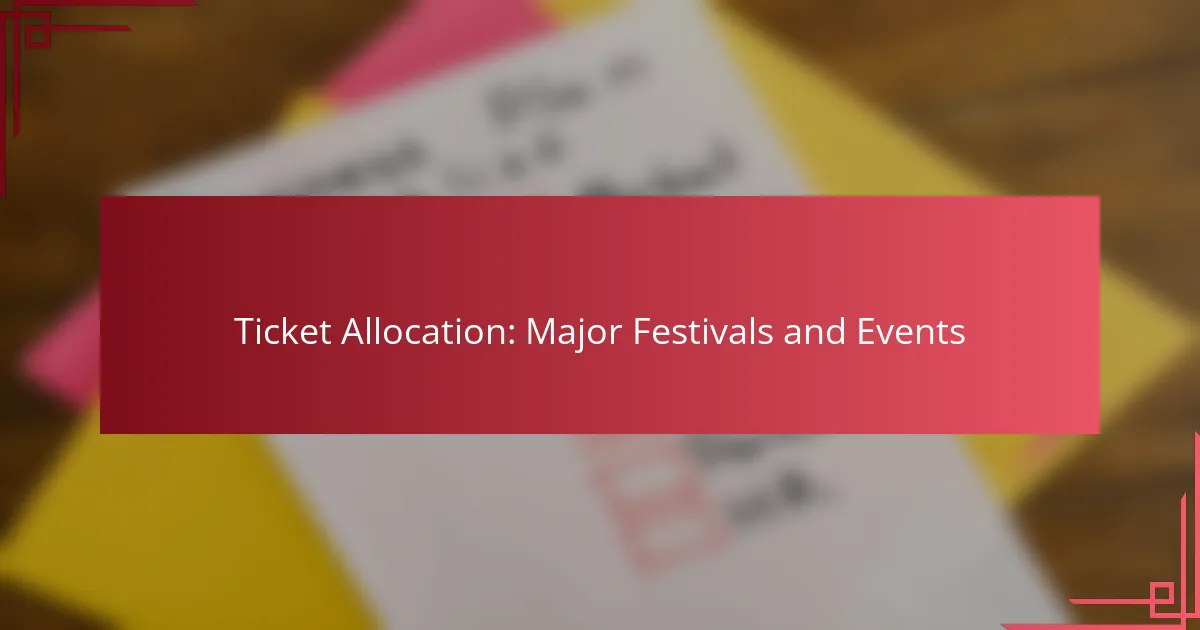Securing tickets for major festivals and events requires prompt action and strategic planning, as popular gatherings often sell out in minutes. To enhance your chances of obtaining tickets, it’s crucial to explore multiple purchasing channels and stay informed about the latest ticketing practices. With challenges such as high demand and limited capacity, understanding effective allocation strategies can make all the difference in your festival experience.

How to secure tickets for major festivals in the UK?
To secure tickets for major festivals in the UK, it’s essential to act quickly and utilize multiple channels. Popular events often sell out within minutes, so being prepared and informed about various ticket sources can increase your chances of success.
Online ticket platforms
Online ticket platforms like Ticketmaster and See Tickets are primary sources for festival tickets. These sites typically offer a straightforward purchasing process, but high demand can lead to website crashes or long waiting times. It’s advisable to create an account in advance and save your payment information to expedite the checkout process.
Some platforms may also provide early access or pre-sale opportunities for registered users, so signing up for newsletters can be beneficial. Keep an eye on the release dates to ensure you don’t miss out.
Official festival websites
Official festival websites are the most reliable sources for ticket purchases. They often sell tickets directly and provide the latest updates on availability and pricing. Purchasing from these sites ensures you avoid scams and inflated prices from unofficial sellers.
Additionally, many festivals offer tiered pricing, where early bird tickets are cheaper. Monitoring these sites regularly can help you snag tickets at a lower price before they sell out.
Ticket resale marketplaces
Ticket resale marketplaces like Viagogo and StubHub allow fans to buy and sell tickets. These platforms can be useful if you missed the initial sale or need to sell tickets you can’t use. However, prices can vary significantly, often exceeding face value.
When using resale sites, check the seller’s ratings and the platform’s policies on refunds and guarantees to avoid potential issues. Be aware of any additional fees that may apply during the purchase process.
Fan-to-fan exchanges
Fan-to-fan exchanges, often facilitated through social media groups or dedicated forums, allow individuals to buy and sell tickets directly. This method can sometimes yield better prices than resale marketplaces, but it carries risks, such as scams or counterfeit tickets.
Always verify the seller’s credibility and consider using secure payment methods that offer buyer protection. Engaging in these exchanges requires caution and due diligence to ensure a safe transaction.
Local box offices
Local box offices at the festival venue may sell tickets on the day of the event or during the lead-up. This option can be advantageous for last-minute attendees, but availability is often limited, especially for popular festivals.
It’s wise to call ahead or check the venue’s website for ticket availability and hours of operation. Some festivals may reserve a portion of tickets for on-site sales, providing a chance to purchase tickets without the online rush.

What are the best practices for ticket allocation at music festivals?
Best practices for ticket allocation at music festivals focus on maximizing attendance while ensuring fairness and accessibility. Effective strategies include early bird sales, pre-registration for exclusive access, and dynamic pricing to optimize revenue and manage demand.
Early bird ticket sales
Early bird ticket sales offer discounted prices for attendees who purchase tickets well in advance. This approach not only incentivizes early commitment but also helps organizers gauge interest and plan accordingly. Typically, these tickets are available for a limited time or until a certain quantity is sold.
To implement early bird sales effectively, set clear deadlines and promote them through various channels, such as social media and email newsletters. Consider offering tiered pricing to encourage quicker purchases, with prices gradually increasing as the event date approaches.
Pre-registration for exclusive access
Pre-registration allows potential attendees to sign up for notifications and exclusive access to tickets before they go on sale. This strategy builds anticipation and creates a sense of exclusivity, which can drive demand. It also helps organizers collect valuable data on potential attendees.
To execute pre-registration, create a simple online form where users can submit their information. Use this data to send targeted marketing messages and reminders as the ticket sale date approaches. Ensure that the registration process is quick and user-friendly to maximize participation.
Dynamic pricing strategies
Dynamic pricing involves adjusting ticket prices based on demand and remaining inventory. This strategy can maximize revenue by charging higher prices during peak demand periods and offering discounts when sales slow down. It requires careful monitoring of sales trends and audience behavior.
When implementing dynamic pricing, establish clear guidelines on how prices will change and communicate these to potential buyers. Use analytics tools to track sales patterns and adjust prices accordingly. Be cautious not to alienate fans with sudden price hikes; transparency is key to maintaining goodwill.

What are the major festivals with ticket allocation challenges?
Major festivals often face ticket allocation challenges due to high demand, limited capacity, and complex purchasing systems. Events like Glastonbury, Reading and Leeds, and Coachella exemplify these difficulties, requiring fans to navigate various strategies to secure their tickets.
Glastonbury Festival
Glastonbury Festival is renowned for its massive attendance and iconic performances, making ticket allocation highly competitive. Tickets typically sell out within minutes, prompting many to employ multiple devices or accounts to increase their chances.
To improve your odds, register for a ticket in advance and familiarize yourself with the purchasing process. Be prepared to act quickly during the sale, as tickets can disappear in low tens of minutes.
Reading and Leeds Festivals
Reading and Leeds Festivals face similar ticket allocation issues, with a strong demand for limited spots. The festivals often implement a tiered pricing system, where early bird tickets are cheaper but sell out rapidly.
To maximize your chances, set reminders for ticket release dates and consider joining fan clubs or mailing lists for exclusive pre-sale opportunities. Having a backup payment method can also expedite the checkout process.
Coachella
Coachella is another festival known for its ticket allocation challenges, with prices that can reach several hundred USD. The festival uses a lottery system for general admission tickets, which can complicate the purchasing experience.
To navigate this, register for the pre-sale and be ready to purchase as soon as tickets become available. It’s advisable to have a clear budget in mind, as additional costs like accommodation and travel can significantly increase overall expenses.

How does ticket allocation work for sporting events?
Ticket allocation for sporting events typically involves a combination of methods to distribute tickets fairly among fans. These methods include season ticket holders, public sales, and VIP packages, each with its own rules and processes.
Season ticket holders
Season ticket holders are often given priority access to tickets for sporting events. This means they can purchase tickets before they are available to the general public, ensuring they have a chance to secure their seats for popular games.
Many teams offer loyalty programs that reward season ticket holders with additional benefits, such as discounts on merchandise or exclusive access to special events. However, maintaining a season ticket can be a significant financial commitment, often costing hundreds to thousands of dollars annually.
Public sales
Public sales are the most common method for distributing remaining tickets after season ticket holders have had their chance. These tickets are typically made available through official team websites or authorized ticket vendors.
During public sales, tickets can sell out quickly, sometimes within minutes. Fans should be prepared by creating accounts on ticketing platforms in advance and being ready to purchase as soon as tickets go live. It’s advisable to check for any specific release dates and times to avoid missing out.
VIP packages
VIP packages offer fans a premium experience, often including not just tickets but also perks like exclusive access to lounges, meet-and-greet opportunities with players, and complimentary food and beverages. These packages can be significantly more expensive than standard tickets.
When considering VIP packages, fans should evaluate the value of the added benefits against the cost. While they can enhance the overall experience, the price may not be justified for every fan. It’s essential to compare what each package offers to ensure it aligns with personal preferences and budget.

What factors influence ticket allocation for events?
Several key factors influence how tickets are allocated for events, including venue capacity, demand forecasting, and ticket pricing models. Understanding these elements can help organizers optimize ticket distribution and maximize attendance.
Venue capacity
Venue capacity is a fundamental factor in ticket allocation, as it determines the maximum number of attendees for an event. Organizers must consider not only the physical space but also safety regulations and comfort levels, which can affect the actual number of tickets available.
For example, a concert hall with a capacity of 5,000 may only sell 4,500 tickets to ensure adequate space for movement and emergency exits. This practice helps prevent overcrowding and enhances the overall experience for attendees.
Demand forecasting
Demand forecasting involves predicting the number of tickets that will be sold based on various indicators such as historical sales data, artist popularity, and market trends. Accurate forecasting is crucial for effective ticket allocation, as it helps organizers decide how many tickets to release and when.
Using tools like surveys or social media engagement metrics can provide insights into potential demand. For instance, if a headlining artist has a strong following, organizers might anticipate higher demand and adjust ticket release strategies accordingly.
Ticket pricing models
Ticket pricing models play a significant role in ticket allocation, influencing both demand and revenue. Different pricing strategies, such as tiered pricing, dynamic pricing, or early bird discounts, can attract various segments of the audience and maximize sales.
For example, offering early bird tickets at a lower price can incentivize early purchases, while dynamic pricing can adjust ticket costs based on real-time demand. Organizers should carefully evaluate which model aligns best with their target audience and event goals to optimize ticket allocation.
